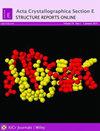catena-poly[[(3-叔丁基吡啶-κN)(4-叔丁基吡啶-κN)镉]-di-μ-硫代氰基-κ(2) N:S;κ(2) S:N]的晶体结构。
IF 0.9
Acta crystallographica. Section E, Structure reports online
Pub Date : 2014-11-19
eCollection Date: 2014-12-01
DOI:10.1107/S1600536814024647
引用次数: 0
摘要
在标题化合物[Cd(NCS)2(C9H13N)2] n的晶体结构中,Cd(II)阳离子被1个3-叔丁基吡啶配体、1个4-叔丁基吡啶配体和2对平移相等的μ-1,3桥接硫氰酸酯配体配位在一般位置上,呈轻微畸变的八面体结构。这些μ-1,3桥接的硫代氰阴离子桥接Cd(II)阳离子,形成平行于b轴传播的链。本文章由计算机程序翻译,如有差异,请以英文原文为准。
![Crystal structure of catena-poly[[(3-tert-butyl-pyridine-κN)(4-tert-butyl-pyridine-κN)cadmium]-di-μ-thio-cyanato-κ(2) N:S;κ(2) S:N].](https://img.booksci.cn/booksciimg/2014-11/2023112878213566658654856559041.jpg)
![Crystal structure of catena-poly[[(3-tert-butyl-pyridine-κN)(4-tert-butyl-pyridine-κN)cadmium]-di-μ-thio-cyanato-κ(2) N:S;κ(2) S:N].](https://img.booksci.cn/booksciimg/2014-11/2023112878230851764103886040417.jpg)
![Crystal structure of catena-poly[[(3-tert-butyl-pyridine-κN)(4-tert-butyl-pyridine-κN)cadmium]-di-μ-thio-cyanato-κ(2) N:S;κ(2) S:N].](https://img.booksci.cn/booksciimg/2014-11/202311287825599247208841113315.jpg)
Crystal structure of catena-poly[[(3-tert-butyl-pyridine-κN)(4-tert-butyl-pyridine-κN)cadmium]-di-μ-thio-cyanato-κ(2) N:S;κ(2) S:N].
In the crystal structure of the title compound, [Cd(NCS)2(C9H13N)2] n , the Cd(II) cations are coordinated in a slightly distorted octa-hedral geometry by one 3-tert-butyl-pyridine ligand, one 4-tert-butyl-pyridine ligand and two pairs of translationally-equivalent μ-1,3-bridging thio-cyanate ligands, all of which are in general positions. These μ-1,3-bridging thio-cyante anions bridge the Cd(II) cations, forming chains that propagate parallel to the b axis.
求助全文
通过发布文献求助,成功后即可免费获取论文全文。
去求助
来源期刊
自引率
33.30%
发文量
0
审稿时长
1.3 months
期刊介绍:
Acta Crystallographica Section E: Structure Reports Online is the IUCr highly popular open-access structural journal. It provides a simple and easily accessible publication mechanism for the growing number of inorganic, metal-organic and organic crystal structure determinations. The electronic submission, validation, refereeing and publication facilities of the journal ensure very rapid and high-quality publication, whilst key indicators and validation reports provide measures of structural reliability. In 2009, the journal published over 4000 structures. The average publication time is less than one month.

 求助内容:
求助内容: 应助结果提醒方式:
应助结果提醒方式:


